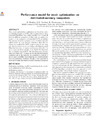Identificador persistente para citar o vincular este elemento:
https://accedacris.ulpgc.es/jspui/handle/10553/45224
| Campo DC | Valor | idioma |
|---|---|---|
| dc.contributor.author | Benítez Díaz, Domingo Juan | en_US |
| dc.contributor.author | Escobar, J. M. | en_US |
| dc.contributor.author | Montenegro, R. | en_US |
| dc.contributor.author | Rodriguez, E. | en_US |
| dc.date.accessioned | 2018-11-22T08:10:45Z | - |
| dc.date.available | 2018-11-22T08:10:45Z | - |
| dc.date.issued | 2018 | en_US |
| dc.identifier.isbn | 978-1-4503-6492-8 | en_US |
| dc.identifier.uri | https://accedacris.ulpgc.es/handle/10553/45224 | - |
| dc.description.abstract | Many mesh optimization applications are based on vertex repositioning algorithms (VrPA). The execution times of these numerical algorithms vary widely, usually with a trade-off between different parameters. In this work, we analyze the impacts of six parameters of sequential VrPA on runtime. Our analysis is used to propose a new workload measure called number of mesh element evaluations. Since the execution time required for VrPA programs may be too large and there is concurrency in processing mesh elements, parallelism has been used to improve performance efficiently. The performance model is extended to parallel VrPA algorithms that are implemented in MPI. This model has been validated using two Open MPI versions on two distributed-memory computers and is the basis for the quantitative analysis of performance scalability, load balancing and synchronization and communication overheads. Finally, a new approach to mesh partitioning that improves load balancing is proposed. | en_US |
| dc.language | eng | en_US |
| dc.publisher | Association for Computing Machinery | en_US |
| dc.source | EuroMPI'18: 25th European MPI Users' Group Meeting Barcelona Spain September, 2018 | en_US |
| dc.subject | 1203 Ciencia de los ordenadores | en_US |
| dc.subject | 1206 Análisis numérico | en_US |
| dc.title | Performance model for mesh optimization on distributed-memory computers | en_US |
| dc.type | info:eu-repo/semantics/conferenceObject | en_US |
| dc.type | ConferenceObject | en_US |
| dc.relation.conference | 25th European MPI Users' Group Meeting, EuroMPI 2018 | en_US |
| dc.identifier.doi | 10.1145/3236367.3236372 | en_US |
| dc.identifier.scopus | 85055414693 | - |
| dc.contributor.authorscopusid | 7003286582 | - |
| dc.contributor.authorscopusid | 7101961409 | - |
| dc.contributor.authorscopusid | 35617533100 | - |
| dc.contributor.authorscopusid | 7401953314 | - |
| dc.identifier.issue | a10 | - |
| dc.investigacion | Ciencias | en_US |
| dc.type2 | Actas de congresos | en_US |
| dc.utils.revision | No | en_US |
| dc.identifier.conferenceid | events121636 | - |
| dc.identifier.ulpgc | Sí | en_US |
| item.fulltext | Con texto completo | - |
| item.grantfulltext | open | - |
| crisitem.event.eventsstartdate | 23-09-2018 | - |
| crisitem.event.eventsenddate | 26-09-2018 | - |
| crisitem.author.dept | GIR SIANI: Modelización y Simulación Computacional | - |
| crisitem.author.dept | IU de Sistemas Inteligentes y Aplicaciones Numéricas en Ingeniería | - |
| crisitem.author.dept | Departamento de Informática y Sistemas | - |
| crisitem.author.dept | GIR SIANI: Modelización y Simulación Computacional | - |
| crisitem.author.dept | IU de Sistemas Inteligentes y Aplicaciones Numéricas en Ingeniería | - |
| crisitem.author.dept | Departamento de Señales y Comunicaciones | - |
| crisitem.author.dept | GIR SIANI: Modelización y Simulación Computacional | - |
| crisitem.author.dept | IU de Sistemas Inteligentes y Aplicaciones Numéricas en Ingeniería | - |
| crisitem.author.dept | GIR SIANI: Modelización y Simulación Computacional | - |
| crisitem.author.dept | IU de Sistemas Inteligentes y Aplicaciones Numéricas en Ingeniería | - |
| crisitem.author.dept | Departamento de Informática y Sistemas | - |
| crisitem.author.orcid | 0000-0003-2952-2972 | - |
| crisitem.author.orcid | 0000-0002-8608-7076 | - |
| crisitem.author.orcid | 0000-0002-4164-457X | - |
| crisitem.author.orcid | 0000-0002-2701-2971 | - |
| crisitem.author.parentorg | IU de Sistemas Inteligentes y Aplicaciones Numéricas en Ingeniería | - |
| crisitem.author.parentorg | IU de Sistemas Inteligentes y Aplicaciones Numéricas en Ingeniería | - |
| crisitem.author.parentorg | IU de Sistemas Inteligentes y Aplicaciones Numéricas en Ingeniería | - |
| crisitem.author.parentorg | IU de Sistemas Inteligentes y Aplicaciones Numéricas en Ingeniería | - |
| crisitem.author.fullName | Benítez Díaz, Domingo Juan | - |
| crisitem.author.fullName | Escobar Sánchez, José M | - |
| crisitem.author.fullName | Montenegro Armas,Rafael | - |
| crisitem.author.fullName | Rodríguez Barrera, Eduardo Miguel | - |
| Colección: | Actas de congresos | |
Visitas
370
actualizado el 15-ene-2026
Descargas
91
actualizado el 15-ene-2026
Google ScholarTM
Verifica
Altmetric
Comparte
Exporta metadatos
Los elementos en ULPGC accedaCRIS están protegidos por derechos de autor con todos los derechos reservados, a menos que se indique lo contrario.
